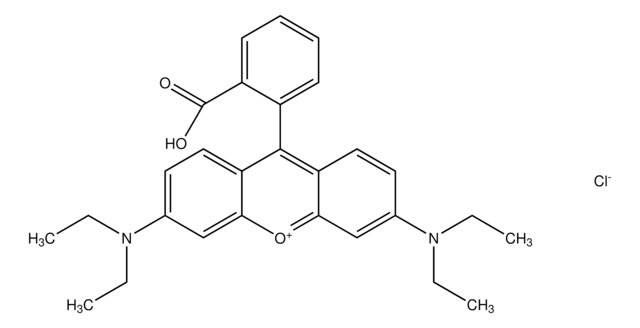02558
Rhodamine B solution
0.2% in isopropanol, for TLC derivatization
About This Item
Recommended Products
grade
for TLC derivatization
Quality Level
concentration
0.2% in isopropanol
technique(s)
thin layer chromatography (TLC): suitable
density
0.79 g/mL at 20 °C
SMILES string
[Cl-].CCN(CC)c1ccc2c(OC3=CC(\C=CC3=C2c4ccccc4C(O)=O)=[N+](\CC)CC)c1
InChI
1S/C28H30N2O3.ClH/c1-5-29(6-2)19-13-15-23-25(17-19)33-26-18-20(30(7-3)8-4)14-16-24(26)27(23)21-11-9-10-12-22(21)28(31)32;/h9-18H,5-8H2,1-4H3;1H
InChI key
PYWVYCXTNDRMGF-UHFFFAOYSA-N
Application
Signal Word
Danger
Hazard Statements
Precautionary Statements
Hazard Classifications
Eye Irrit. 2 - Flam. Liq. 2 - STOT SE 3
Target Organs
Central nervous system
Storage Class Code
3 - Flammable liquids
WGK
WGK 2
Flash Point(F)
53.6 °F - closed cup
Flash Point(C)
12 °C - closed cup
Personal Protective Equipment
Choose from one of the most recent versions:
Already Own This Product?
Find documentation for the products that you have recently purchased in the Document Library.
Customers Also Viewed
Our team of scientists has experience in all areas of research including Life Science, Material Science, Chemical Synthesis, Chromatography, Analytical and many others.
Contact Technical Service












